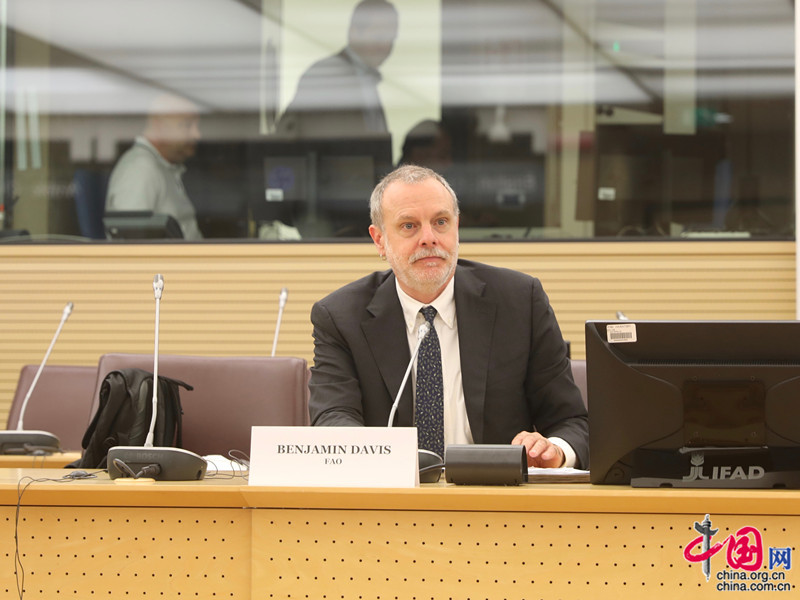FAO: Partnerships key to SDG1 and SDG2
chinagate.cn, September 30, 2021 Adjust font size:

Dr. Benjamin Davis, Strategic Programme Leader and Senior Economist at FAO, addresses a speech at the International Workshop on Global Poverty Reduction Partnerships in Rome, Italy, on June 5. [Photo by Yang Xiaoxiao / China.org.cn]
Building partnerships to end poverty and hunger is the very core of their mandate, the UN’s Food and Agriculture Organization (FAO) said Thursday at the International Workshop on Global Poverty Reduction Partnerships in Rome, Italy.
Dr. Benjamin Davis, Strategic Programme Leader and Senior Economist at FAO, said that despite the progress achieved in the past decades, about 783 million people continue to live in extreme poverty ($1.90 a day), and an even greater number when considering multidimensional poverty.
“Hunger is also on the rise. In 2016, the number of chronically food-insecure people reached 815 million, up from 777 million in 2015, mainly due to conflicts and effects of climate change,” he added.
Davis highlighted two dimensions of poverty and hunger: eradicating hunger and poverty, particularly extreme poverty, are interrelated; poverty and hunger today are mostly a rural phenomenon.
“We face daunting challenges,” he said, “FAO, in partnership with other UN organizations and member countries, is committed to addressing the constraints.”
According to Davis, many countries have already developed successful policies and programmes that are reducing poverty and hunger that also serve as examples for others, especially for those with similar socio-cultural and economic backgrounds.
He emphasized that knowledge sharing through South-South and Triangular Cooperation is a very powerful tool to facilitate the exchange of best practices among countries of the Global South.
Since 2016, FAO has promoted the Knowledge Exchange Platforms (KEPs) on rural poverty reduction, a tool to facilitate direct knowledge exchange among countries facing similar challenges and foster cooperation to meet SDG 1 and SDG 2 by 2030.
“Our fruitful partnership with the International Poverty Reduction Centre in China and the China Internet Information Center, starts back in 2016. We co-hosted the 2017 China Poverty Reduction International Forum. Last month we also co-hosted the 2018 Forum, where ‘Global Solicitation and Challenge Prize on Best Practices’ was launched,” he said.